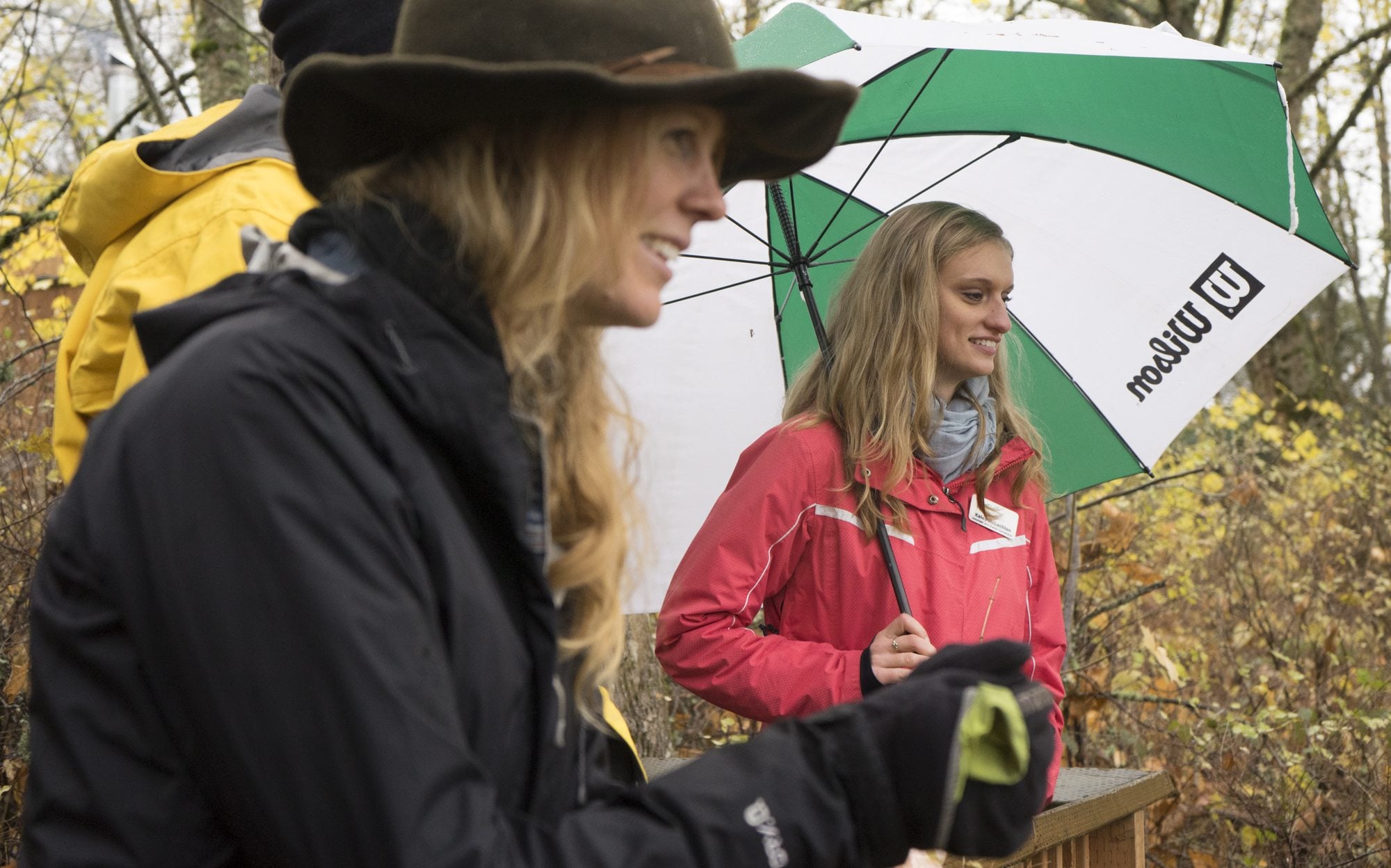Kaley McLachlan Burton grew up knee-deep in Clark County mud. She fished in local creeks and picked blackberries off out-of-control brambles.
“I grew up outdoors. I was not afraid of nature. I was never afraid of getting dirty,” she said.
A great student at Skyview High School and the University of Washington, Burton felt some pressure to become a doctor or lawyer or other uber-professional. “But none of those felt right,” she said. What always felt right was the local mud that never really did squish all the way out from between her toes.
She probably could have followed the lead of her environmental-activist friends and gone somewhere bigger, more liberal-leaning and closer to the real action, such as Portland or Seattle or even San Francisco or Washington, D.C.
Instead, Burton got a job as volunteer and events coordinator at Columbia Springs Environmental Education Center in southeast Vancouver.
“I came back here,” she said. “I’m the boots on the ground.”
Burton is “24 going on 40,” she said. She was the slightly serious kid who hung out with the grown-ups more than her peers, she said. In middle school, she was treated to some pretty severe bullying and had a rough time of it; she used to withdraw on weekends to her older sister’s rented cottage in the vicinity of what would become Columbia Springs. It was a place to go for idyllic walks among the trees, she said.
She did the Running Start program at Clark and then attended UW in Seattle — where she happened to land in a survey course that offered overviews of environmental careers. It was a huge eye-opener, she said. She’d never realized that saving the planet could be a paying gig.
Burton wound up earning two bachelor’s degrees in four years: one in environmental studies, covering the “social and political” angles of saving the world, she said, and another in biology, with a focus on ecology, evolution and conservation. That meant studying not just microscopic organisms but how they behave on the macro level, she said: rivers and forests, landscapes and change. (With those two degrees, Burton’s proud father told her, “You got the science side and you got the (B.S.) side too.”)
Along the way, Burton had an internship and then a summer job with what was then Vancouver-Clark Parks and Recreation — where she discovered that, despite an introverted and serious nature, she loved serving the public and handling its more-than-occasional kookiness. (Like the time a worried bride called to ask whether parks staff would be removing all pine cones from the grass around the gazebo she’d rented for wedding photos. Short answer: no.)
Mostly, Burton said, she loved helping connect people with nature.
“I never knew how much I’d like working with the public,” she said. “I loved it so much. I still miss that job sometimes.”
“Environmentalists are ruining the world,” somebody barked at Burton as she staffed a Columbia Springs table at a recent home and garden fair.
It was an abrupt reality check: “Not everyone is motivated by hugging a tree,” she said.
Good thing that her senior project in college was a case study of Columbia Springs itself, and the language it has used — with mixed success — to frame its mission and reach out to the community. “Why were we not reaching more people?”
Her conclusion: The more shrill and “militaristic” the message, the less the middle-of-the-road public trusts it. Maybe it’s different in Portlandia, she said, but here in Clark County, “Fight the war on invasive species!” is preaching to a small choir but alienating a larger one. “The message was very ‘ecological warfare,’ ” and it just didn’t appeal, she said.
What has worked better: “Come help protect your community’s largest urban natural area!” “Come help keep this a healthy, livable community!”
Stressing community values and personal health have brought in donors and volunteers in a way that calls-to-arms never did, Burton said. “I think you’re seeing that in the environmental field as a whole,” she said. People like learning simple, practical ways to participate and seeing evidence that it matters.
Folks who take daily walks at Columbia Springs report getting great satisfaction from humble efforts like feeding the birds or yanking up invasive ivy as they go, she said. Others show up for occasional work parties and report amazement at how great the place looks with just a bit of shared effort.
And Burton said she knows of at least one little boy whose summer camp experience at Columbia Springs helped him deal with the grief of losing his father. That touches on the growing body of scientific evidence that spending time in the great outdoors — hugging trees, so to speak — is good for both physical and mental health. Even hard-core non-environmentalists can agree to that, she said.
“I love seeing the lightbulb go on over people’s heads,” she said. “You can do something little and it can make a big difference. We want people to see that difference.”




